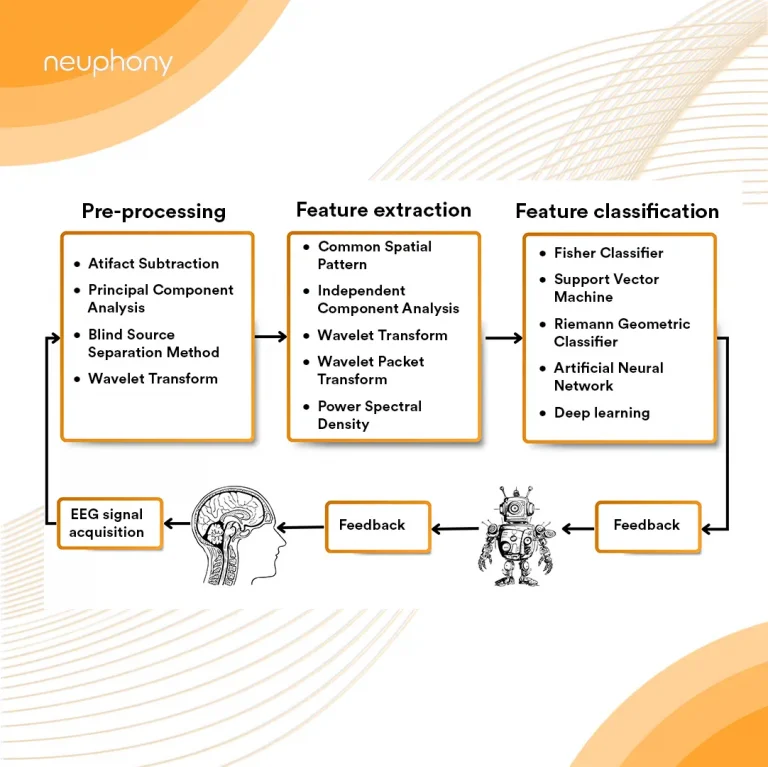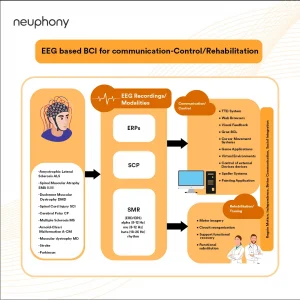Neuphony Research Team | Published on October 5, 2024 | 5 Mins Read

In the realm of healthcare, perhaps no field has seen as much innovation and promise as mental health care. With the rise of Brain-Computer Interfaces (BCIs), a new frontier has emerged, offering unprecedented insights into the workings of the human brain and its impact on mental well-being. mental health at work In this article, we delve into the intricacies of BCIs, their relevance to mental health, and the transformative potential they hold for global mental health care.
brain computer interface devices, commonly known as BCIs, are sophisticated systems that establish a direct communication pathway between the brain and external devices. These devices translate neural signals into commands that can control computers, prosthetic limbs, or other devices without needing physical movement. Moreover, BCIs can utilize various methods for signal acquisition, including electroencephalography (EEG), functional magnetic resonance imaging (fMRI), and invasive neural implants.
Furthermore BCIs decode brain activity, offering insights into mental disorders’ mechanisms, making them vital for mental health. BCIs analyze neural patterns in depression, anxiety, and PTSD, offering new pathways for diagnosis, treatment, and rehabilitation.
The potential benefits of BCIs in addressing mental health issues are vast and multifaceted. Moreover, one significant advantage lies in their ability to provide objective, quantitative data about brain function, overcoming the limitations of self-reported symptoms and subjective assessments. This objective data can lead to more accurate diagnoses and personalised treatment plans tailored to individual brain patterns.
For example, researchers at the University of California, San Francisco, have developed a BCI system that can predict whether patients with depression will respond positively to a specific antidepressant medication with 89% accuracy. This personalised approach to treatment has the potential to revolutionise psychiatric care, minimising the trial-and-error process often associated with finding the right medication for each patient.
Furthermore, BCIs enable neurofeedback therapy, a technique in which individuals learn to self-regulate their brain activity in real time. This approach has shown promising results in treating conditions such as anxiety, PTSD, and ADHD. By providing immediate feedback on brain activity, BCIs empower individuals to develop self-awareness and control over their mental states, leading to long-lasting therapeutic benefits.

The evolution of Brain-Computer Interface technology has been nothing short of remarkable. Over the past few decades, advancements in neuroscience, engineering, and computing have fueled the development of increasingly sophisticated BCIs. Transitioning from bulky laboratory prototypes to sleek, wearable devices, BCIs have become more accessible and user-friendly.
One notable advancement is the development of non-invasive BCIs, which rely on methods such as EEG and fMRI to capture brain activity without the need for surgical implants. These non-invasive approaches offer greater safety and convenience, making BCIs suitable for a wider range of applications, including mental health care.
In the field of mental health, BCIs are already being integrated into various treatment modalities. For example, researchers at the University of Pittsburgh have developed a BCI system that can detect early signs of suicidal thoughts based on changes in brain activity. This early detection mechanism could potentially save lives by alerting healthcare providers to intervene before a crisis occurs.
Looking ahead, the potential impact of BCIs on global mental health is immense. Mental health disorders impact 450 million globally, yet access to care remains limited, especially in low-income countries.
BCIs have the potential to address some of these barriers by providing remote access to specialised mental health services. Moreover, researchers at the University of Washington developed a BCI system enabling paralyzed individuals to communicate using brain signals alone. This technology could greatly enhance life quality for those with severe mental health conditions, enabling fuller societal participation.
However, the widespread adoption of BCIs also raises significant ethical and privacy concerns. As BCIs become more integrated into everyday life, questions arise about data security, consent, and the potential for misuse. Establishing strong regulations is crucial to ensure responsible BCI use while prioritizing patient autonomy and confidentiality.
– According to the World Health Organization, depression is the leading cause of disability worldwide, affecting over 264 million people.
– Suicide is the second leading cause of death among individuals aged 15-29 globally. Additionally, nearly 800,000 people take their own lives each year.

In conclusion, BCIs revolutionize mental health care, offering new hope for millions battling mental illness. BCIs decode brain activity, offering deeper insights into mental disorders and personalized treatments tailored to individual brain patterns.
As BCIs advance in healthcare, therefore, addressing their ethical, legal, and social implications becomes crucial. Transitioning to responsible deployment is essential to fully harness this technology’s potential for enhancing mental health and global well-being.